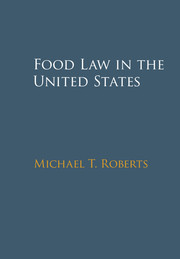1 - Introduction
Published online by Cambridge University Press: 18 December 2015
Summary
Definition of Food Law
[1] Adaptation of Food Law
Food law is both old and new. From the beginning of recorded history, societies have sought to regulate the production, trade, and consumption of food. This historical fact makes sense given the important roles of food: food sustains life; food affects quality of life; food shapes societies; food manifests cultural values. The modern food society has transformed food – its composition, taste, availability, value, and appearance – raising novel societal issues that affect the lives of consumers. In response, food law is adapting and developing into a distinctive area of law. Indeed, if the measure of the importance of law is how it affects the lives of people on a daily basis, then food law as it has developed is of paramount significance.
The adaptability of food law reflects the notion articulated by legal historian Lawrence M. Friedman, in The History of American Law, that modern law mirrors society and moves with its times so that it is always new. Friedman explains that “[i]n traditional cultures, law was basically static: a divine or time-honored body of rules. It defined people's place in the order of society. In modern times, law is a tool, an instrument; the people in power use it to push or pull toward some definite goal.” While it is true that law also influences society and promotes change, the adaptation of food law to the modern food system and to the interest of consumers is why food law is new, as well as provocative: the adaptation requires new rules and fresh ideas and the two subjects – the modern food system and the interest of consumers – are not always in sync. In other words, the goal is not always definite. As a result, palatable tensions in food law provoke divisive issues (proposed mandatory labeling for genetically modified food, zoning rules for the production of backyard chickens, and proposed restrictions on sugar-added beverages, to name just a few) that make food law interesting and relevant to modern civil society.
[2] Phases of Food Law
[a] Phases: Sequential and Cumulative
The field of modern, emerging food law could be organized in diverse ways. This treatise divides food law into five topical phases: commerce, safety, marketing, nutrition, and systems. These phases constitute the chapters presented in this treatise.
- Type
- Chapter
- Information
- Food Law in the United States , pp. 1 - 37Publisher: Cambridge University PressPrint publication year: 2016



